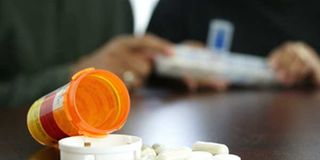Copies of cancer drugs set to lower cost of treatment

In a bid to make life-saving drugs more widely available in poorer countries, the WHO announced last week that from September it will accept applications from drug manufacturers seeking assessment of biosimilar versions of two cancer drugs: Rituxam, marketed generically as rituximab, (used to treat blood cancers) and Herceptin, also known as trastuzumab, (used to treat breast cancer). PHOTO | FILE
What you need to know:
- Biosimilars are drugs designed to have active properties similar to ones that have previously been licensed. However, unlike generic medicines that are manufactured using chemical processes, these types of drugs are manufactured from biological sources, such as a bacterium or yeast.
- This news comes two months after 20 patients were put on treatment with the breast cancer drug (Herceptin) that can cure early stages of the disease.
- A number of biosimilar drugs, which are never exactly the same as original products, have already been approved for use.
The World Health Organisation has launched a pilot project to explore the potential of cheap copies of expensive cancer drugs.
In a bid to make life-saving drugs more widely available in poorer countries, the WHO announced last week that from September it will accept applications from drug manufacturers seeking assessment of biosimilar versions of two cancer drugs: Rituxam, marketed generically as rituximab, (used to treat blood cancers) and Herceptin, also known as trastuzumab, (used to treat breast cancer). The two drugs are already part of the WHO’s essential medicines list.
Biosimilars are drugs designed to have active properties similar to ones that have previously been licensed. However, unlike generic medicines that are manufactured using chemical processes, these types of drugs are manufactured from biological sources, such as a bacterium or yeast.
The latest move is meant to help low- and middle-income countries deliver sustainable treatments to patients and to give incentives to manufacturers to continue making the required medicines.
CO-FUNDING MECHANISM
Products that will be deemed to be equivalent to the versions produced by the parent manufacturer in terms of quality, safety and efficacy will be prequalified, meaning that United Nations agencies can procure them for aid programmes. Pre-qualified drugs will also be eligible for distribution in emerging markets. Many countries use the WHO pre-qualification as an indicator of quality when sourcing medicines for national healthcare programmes.
“Innovator biotherapeutic products are often too expensive for many countries, so biosimilars are a good opportunity to expand access and support countries to regulate and use these medicines,” said WHO Assistant Director General for Health Systems and Innovation Marie-Paule Kieny.
This news comes two months after 20 patients were put on treatment with the breast cancer drug (Herceptin) that can cure early stages of the disease.
The patients being treated for free at Kenyatta National Hospital (KNH) are the first batch of beneficiaries of the public-private partnership between the government and Roche, an international pharmaceutical company, on a “co-funding mechanism.”
Without this partnership, patients would have paid Sh250, 000 for a dose, with a patient requiring at least 18 doses of the injectable drug to be treated, a regimen that would cost close to Sh4.5 million.
Breast cancer is the second most prevalent type of cancer in Kenya. In 2012, approximately 4,500 women were diagnosed with breast cancer according to the Kenya Network of Cancer Organisations.
A number of biosimilar drugs, which are never exactly the same as original products, have already been approved for use.
The international health agency began pre-qualifying drug suppliers 16 years ago in an effort to ensure HIV/Aids, malaria and TB medicines bought by national procurement agencies were of appropriate quality.
The latest pre-qualification plan was announced alongside a commitment to advocate for “fairer prices for all biotherapeutics.”
The WHO announced that it is also looking at extending the scheme to include versions of insulin.



